

Russia. Country spanning Eastern Europe and Northern Asia Coordinates: 60°N 90°E / 60°N 90°E / 60; 90 Russia (Russian: Россия, Rossiya, Russian pronunciation: [rɐˈsʲijə]), or the Russian Federation,[c] is a transcontinental country spanning Eastern Europe and Northern Asia.
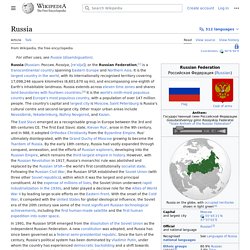
It covers over 17,125,191 square kilometres (6,612,073 sq mi), consists of more than one-eighth of the Earth's inhabited land area, extends to eleven time zones, and has borders with sixteen sovereign nations. 俄罗斯国歌 ——Russian national anthem. 苏联. Eastern Front (World War II) Communist Party of the Russian Federation. The Communist Party of the Russian Federation (CPRF/KPRF) (Russian: Коммунистическая Партия Российской Федерации; КПРФ; Kommunisticheskaya Partiya Rossiyskoy Federatsii) is a communist party in Russia.
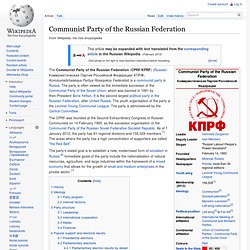
Joseph Stalin. Joseph Stalin or Iosif Vissarionovich Stalin (Russian: Ио́сиф Виссарио́нович Ста́лин, pronounced [ˈjɵsʲɪf vʲɪsɐˈrʲɵnəvʲɪtɕ ˈstalʲɪn]; born Ioseb Besarionis Dze Jugashvili, Georgian: იოსებ ბესარიონის ძე ჯუღაშვილი, pronounced [iɔsɛb bɛsɑriɔnis dzɛ dʒuɣɑʃvili]; 18 December 1878[1] – 5 March 1953) was the leader of the Soviet Union from the mid-1920s until his death in 1953.
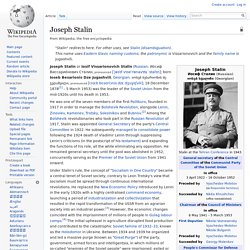
He was one of the seven members of the first Politburo, founded in 1917 in order to manage the Bolshevik Revolution, alongside Lenin, Zinoviev, Kamenev, Trotsky, Sokolnikov and Bubnov.[2] Among the Bolshevik revolutionaries who took part in the Russian Revolution of 1917, Stalin was appointed General Secretary of the party's Central Committee in 1922. He subsequently managed to consolidate power following the 1924 death of Vladimir Lenin through suppressing Lenin's criticisms (in the postscript of his testament) and expanding the functions of his role, all the while eliminating any opposition. Early life Rise to power J. Georgy Zhukov. Amongst many notable generals in World War II, Zhukov was placed at the top due to the number and scale of victories,[1] and his talent in operational and strategic command was recognized by many people.[2] Many famous military leaders in the world such as Bernard Law Montgomery and Dwight David Eisenhower had already recognized Zhukov's great contributions in many important victories in the Second World War.[3] His combat achievements became valuable heritages in humanity's military knowledge, exerting great influence on both the Soviet and the whole world's military theory.[4] Early life and career[edit] Peacetime service until Khalkhin Gol[edit]
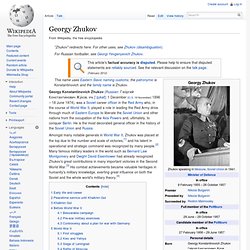
Federal Security Service (Russia) Flag of the Federal Security Service Under the federal law, the FSB is a military service just like the Armed Forces, the MVD, the FSO, the SVR, the FSKN and EMERCOM's civil defence, but its commissioned officers do not normally wear military uniform.
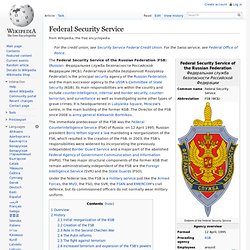
Overview[edit] The FSB combines functions and powers similar to those exercised by the United States FBI National Security Branch, Immigration and Customs Enforcement (ICE), the Federal Protective Service, the National Security Agency (NSA), U.S. Customs and Border Protection, United States Coast Guard, and partly the Drug Enforcement Administration. Nikita Khrushchev. Vladimir Putin.
Vladimir Vladimirovich Putin (Russian: Влади́мир Влади́мирович Пу́тин, IPA: [vɫɐˈdʲimʲɪr vɫɐˈdʲimʲɪrəvʲɪt͡ɕ ˈputʲɪn] ( ), born 7 October 1952) has been the President of Russia since 7 May 2012.
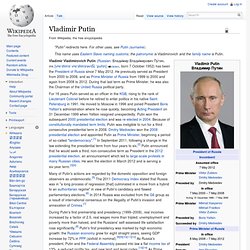
He previously served as President from 2000 to 2008, and as Prime Minister of Russia from 1999 to 2000 and again from 2008 to 2012. During that last term as Prime Minister, he was also the Chairman of the United Russia political party. For 16 years Putin served as an officer in the KGB, rising to the rank of Lieutenant Colonel before he retired to enter politics in his native Saint Petersburg in 1991.
He moved to Moscow in 1996 and joined President Boris Yeltsin's administration where he rose quickly, becoming Acting President on 31 December 1999 when Yeltsin resigned unexpectedly. Ancestry, early life and education Putin's father, Vladimir Spiridonovich Putin with his mother, Maria Ivanovna, in July 1958 KGB career Putin in KGB uniform Political career. Saint Petersburg. In Russian literature, informal documents, and discourse, the word "Saint" (Russian: Санкт) is usually omitted, leaving "Petersburg" (Russian: Петербург).
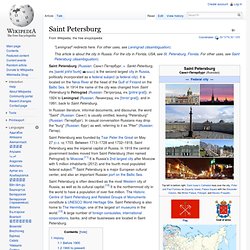
In casual conversation Russians may drop the "burg" (Russian: бург) as well, referring to it as "Piter" (Russian: Питер). Saint Petersburg was founded by Tsar Peter the Great on May 27 [O.S. 16] 1703. Between 1713–1728 and 1732–1918, Saint Petersburg was the imperial capital of Russia. In 1918 the central government bodies moved from Saint Petersburg (then named Petrograd) to Moscow.[11] It is Russia's 2nd largest city after Moscow with 5 million inhabitants (2012) and the fourth most populated federal subject.[6] Saint Petersburg is a major European cultural center, and also an important Russian port on the Baltic Sea. The city was built by conscripted peasants from all over Russia; a number of Swedish prisoners of war were also involved in some years[18] under the supervision of Alexander Menshikov. On November 7, 1917 (O.S. Moscow. Moscow (/ˈmɒskaʊ/ or /ˈmɒskoʊ/; Russian: Москва, tr.
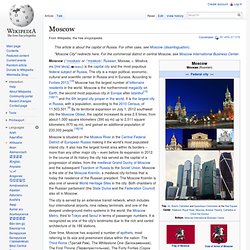
Moskva, IPA: [mɐˈskva] ( Moscow is situated on the Moskva River in the Central Federal District of European Russia making it the world's most populated inland city. It also has the largest forest area within its borders – more than any other major city – even before its expansion in 2012. Novosibirsk.